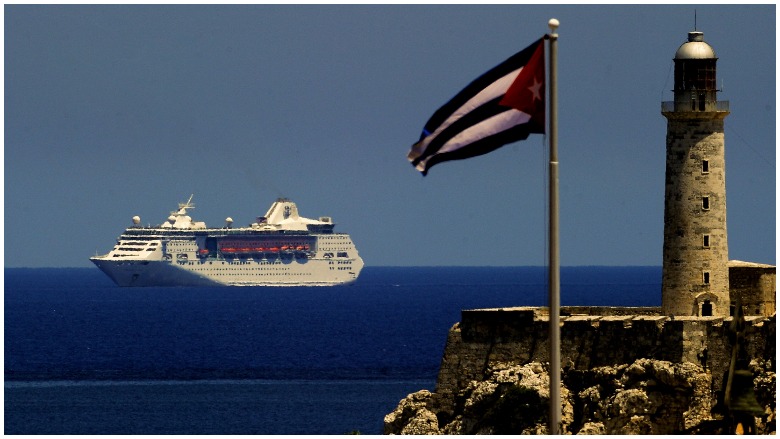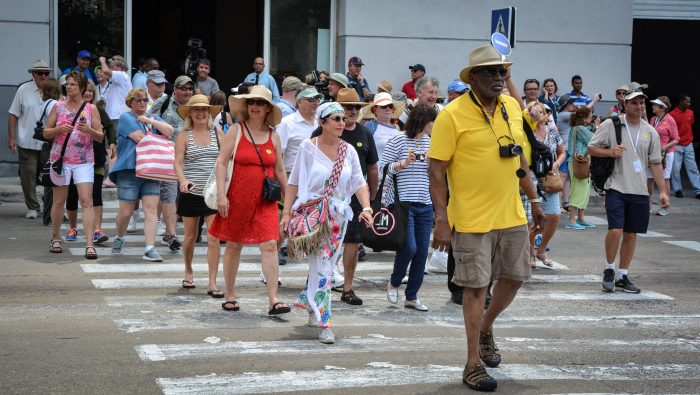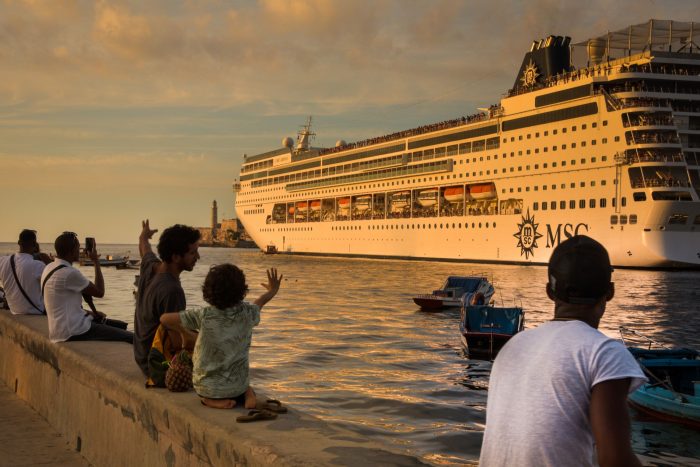
Getty
American cruise ships are no longer traveling to Cuba, ending the most popular method U.S. tourists used to visit the island. The Trump administration implemented the new travel restrictions on June 5, 2019.
The new rules apply to all cruise ships that originate in the United States or make stops at U.S. ports. Florida-based cruise lines Carnival Corporation, Royal Caribbean International, Norwegian Cruise Line Holdings, and MSC Cruises all have trips planned to Cuba this year, but now have to make adjustments to those reservations.
The new sanctions also end authorization for “people-to-people educational travel,” which organizations used to promote greater contact between American and Cuban citizens. The tightened regulations do not restrict Cuban-Americans from visiting family.
Treasury Secretary Steven Mnuchin announced that the new travel restrictions were put in place in order to deprive the Cuban regime of tourism revenue. His written statement explained, “Cuba continues to play a destabilizing role in the Western Hemisphere, providing a communist foothold in the region and propping up U.S. adversaries in places like Venezuela and Nicaragua by fomenting instability, undermining the rule of law, and suppressing democratic processes. This Administration has made a strategic decision to reverse the loosening of sanctions and other restrictions on the Cuban regime. These actions will help to keep U.S. dollars out of the hands of the Cuban military, intelligence, and security services.”
Here’s what you need to know.
1. Cruise Lines With Trips to Cuba Scheduled Before June 5 May Have to Apply for Federal Permits, But It’s Not Yet Clear if the Administration Would Grant Them

GettyPassengers of the first US-to-Cuba cruise ship to arrive in the island nation in decades, walk in the streets of Havana right after disembarking on May 2, 2016.
Passengers who booked cruise vacations with planned stops in Cuba are finding their routes have been altered. The new travel restrictions impact “passenger and recreational vessels and private and corporate aircraft,” according to a press release from the Treasury Department. All are deemed ineligible to receive licenses to travel to Cuba.
Attorney Pedro Freyre, who represents Carnival and other cruise lines, told the Associated Press that his clients were initially hopeful that they would be able to complete trips that passengers booked prior to June 5. But that doesn’t appear to have shaken out. MSC Cruises shared updated itineraries for upcoming cruises that were originally meant to stop in Cuba but will now have to go elsewhere.
Freyre said, “For now, it’s prohibited unless the cruise lines request a specific license.” He added that tourists should check with the cruise line before leaving for their trip to see if it was canceled or re-routed.
2. Tourists Who Booked Flights to Cuba Before June 5 as Part of ‘People-to-People’ Trips Will Be Permitted to Go
Flying to Cuba will not be an immediate problem for American tourists. Individuals or groups that had planned “people-to-people” trips and had already made travel arrangements are allowed to proceed with the trip.
The tour company Insight Cuba explained on its website that the special trips offered a unique way for citizens of both countries to learn more about each other. The message on the website’s home page states, “Our travelers discover Cuba through its people, from a local’s perspective. You’ll get to know extraordinary people who will inspire you, share their stories and listen to yours.”
The tightened restrictions remove authorization for educational and cultural trips. The amendment, which was scheduled to be officially added to the Federal Register on June 5, 2019, is explained here:
“The Department of the Treasury’s Office of Foreign Assets Control (OFAC) is amending the Cuban Assets Control Regulations to implement portions of the President’s foreign policy toward Cuba. This amendment removes authorization for group people-to-people educational travel and provides a ‘grandfathering’ provision to authorize certain group people-to-people educational travel that previously was authorized where the traveler has already completed at least one travel-related transaction (such as purchasing a flight or reserving accommodation).”
3. Trips Classified as ‘Support for the Cuban People’ Will Still Be Permitted
American travelers were given greater freedom to visit Cuba in 2016. President Obama’s administration took steps to normalize relations with Cuba and with that, allowed Americans to apply for general licenses to visit the island. There were 12 categories of authorized travel, as listed by the Treasury Department’s Office of Foreign Assets Control:
• Family visits
• Official business of the U.S. government, foreign governments and certain intergovernmental organizations
• Journalistic activity
• Professional research and professional meetings
• Educational activities
• Religious activities
• Public performances, clinics, workshops, athletic and other competitions, and exhibitions
• Support for the Cuban people
• Humanitarian projects
• Activities of private foundations or research or educational institutes
• Exportation, importation, or transmission of information or information materials
• Certain authorized export transactions
The president of Insight Cuba, Tom Popper, told the New York Times that the travel company would change its tours so that they would fall into the “support for Cuba” category. He told the Times, “You have to have a full schedule of activities like going to meet with one community project and then another. Going to hang out at the beach in the afternoon won’t cut it.” Visitors also have to stay in a private home instead of a hotel.
4. Trump Administration Officials Say the Travel Restrictions Are Tied to National Security
The Trump administration has stated that the new restrictions on non-family travel to Cuba are for national security reasons. To put it simply, the idea is to prevent the Cuban regime from benefiting financially from American tourists.
President Trump’s National Security Advisor, John Bolton, wrote on Twitter, “The Administration has advanced the President’s Cuba policy by ending ‘veiled tourism’ to Cuba and imposing restrictions on vessels. We will continue to take actions to restrict the Cuban regime’s access to U.S. dollars.”
Bolton continued, “Cuba has continued to prop up the illegitimate Maduro regime in Venezuela and will be held responsible for this ongoing man-made crisis. President Trump has made it clear that we stand with the Cuban and Venezuelan people as they fight for freedom.”
Senator Marco Rubio, who is the son of Cuban immigrants and grew up in Miami, praised the new travel restrictions as a way to punish Cuba for supporting the regime in Venezuela. He told the Miami Herald, “The Trump administration deserves tremendous credit for holding accountable the Cuban regime. As the Cuban regime continues to export its destructive communist agenda throughout our hemisphere, and to directly empower the narco-terrorist Maduro regime, the United States must use all tools available under U.S. law to counter the Cuban regime’s deceitful activities to undermine U.S. policy.”
5. Cruise Travel Has Been the Most Popular Method For Americans to Visit Cuba

People wave as a cruise ship leaves Havana’s harbor on February 20, 2017.
Travel to Cuba had been expected to increase significantly in 2019. The Associated Press reported that in the first four months of 2019, cruise ships brought 142,721 people from the United States to Cuba. That represented a 300 percent increase from the year before.
In 2018, Cuba had approximately 4.8 million visitors from around the world. According to Michel Bernal, Cuba’s commercial director for tourism, that total included 638,000 people from U.S. cruise lines